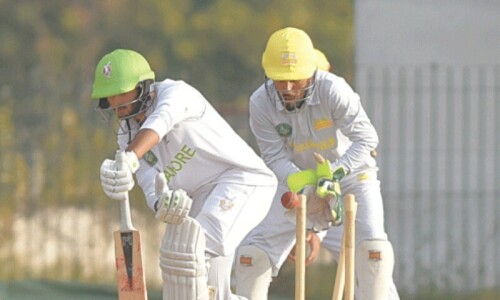ISLAMABAD: The Pakistan Institute of Peace Studies (PIPS) on Thursday launched its policy brief on countering violent extremism, which calls for developing a holistic strategy that covers multiple fronts. The policy brief, “National strategy of inclusive Pakistan”, was the outcome of 10 national level consultations with intellectuals and stakeholders on the specific theme of countering violent extremism.
The report noted that the road to security in Pakistan lies in diversity. Pakistan is a diverse country with diverse groups of people having diverse opinions; escape from the diversity is inescapable.
The state should realise upon the extremism that has crept into society over the years. A great role is due upon parliamentarians who can help confront the issue by instilling a fresh narrative, overseeing policies impacting internal peace, tightening rules and procedures of extremist-fighting bodies, and above all holding debates on the causes and remedies of extremism.
The report noted how militancy revolved around exclusion. Extremists not only attack non-Muslims, a marginalised group, but also thrive in excluded territories such as the tribal areas. This should be explored and addressed.
Senator Raja Zafarul Haq, the leader of the House in Senate, was the chair of the session. He vowed to bring a resolution in the Senate to constitute a “committee of the whole” to address the issue of extremism confronting the country.
Senator Farhatullah Babar called upon the government to look at the “exclusivity” of these areas. He said the state was so far unable to establish a common structure for the police of the four provinces to counter terrorism.
“Along with focusing on development infrastructure, the government should also focus on intellectual infrastructure, which is not possible without freedom of expression. Unfortunately, the government is curbing it on the name of national security.”
He wondered why the process of mainstreaming Fata was stopped, asking the government to immediately mainstream the area as committed.
“Even if a counter alternate narrative was developed it will still be open to question whether it will work in a country where the person apparently sitting on the driving seat is not the actual driver.”
He said proscribed organisations such as Jaish and its leader Maulana Masood Azhar are protected against UN action; militants like Asmatullah Muawia roam free and banned outfits have reared their heads under different names. With a reality like this, how one can be sure of the success of the counter narrative, even if one was developed, for fighting militancy, he added.
Founding head of NACTA, Tariq Parvez, said when it comes to the National Action Plan much of the progress had been military-driven, involving military or paramilitary forces.
“If we want sustainable improvement in the situation, we need to strengthen civil institutions and civil government should own the national counterterrorism efforts. Military forces can only provide the breathing space to the government.”
Dr Jaffar Ahmed from Karachi University argued that for all the intellectual debates aimed at riding Pakistan of extremism, there had been a consensus that the Constitution should be the main source of theoretical and operational guidance.
Zafarullah Khan, adviser to the prime minister, said the government understands the gravity of the problem and has been brainstorming about it.
Introducing the report, PIPS’s director Mohammad Amir Rana observed that violent extremism in Pakistan was a multi-dimensional phenomenon and permeated across different segments.
“The tendency of extremism is growing in the society and parliament is the key body to address it, but it is important to know whether parliament is ready to take this challenge. We always talk about the narratives and counter-narratives but now we will have to talk about the comprehensive solutions.”
Former senator Afrasiab Khattak said: “We have remained in the state of denial for many years but the problem of extremism is growing fast and we are heading towards a new war as Daesh is making its ground in Pakistan.”
Published in Dawn, May 26th, 2017















































Dear visitor, the comments section is undergoing an overhaul and will return soon.